Table of Contents
Tryptophan is the sole precursor of serotonin. L-Tryptophan’s role in brain serotonin synthesis is critical for mood, behavior and cognition.
Serotonin is often referred to as the “happiness molecule”. Low serotonin levels can result in pain, insomnia, depression, seasonal affective disorder, and chronic fatigue.
For your body to manufacture serotonin, it needs an adequate supply of the natural amino acid Tryptophan. As a nootropic supplement, Tryptophan is used for anxiety, ADHD, depression, insomnia, memory loss, pain, and eating disorders.[i]
A lack of bioavailable Tryptophan in your body can have a big impact on your life.
Tryptophan helps:
- Anxiety & Mood. Tryptophan is an essential amino acid needed to synthesize serotonin which plays a role in mood, sleep, learning and even appetite control.
- ADHD. Low levels of Tryptophan and serotonin imbalances in the brain are associated with ADHD. Studies have found that children with ADHD have 50% lower than average levels of Tryptophan.[ii]
- Neurotransmitters. Low levels of Tryptophan can result in short- and long-term memory loss. Supplementing with Tryptophan has been found to improve memory in healthy adults.
Overview
Tryptophan is an essential amino acid and precursor to serotonin, melatonin and niacin (Vitamin B3) in your body.
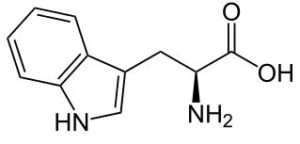
The enzyme Tryptophan hydroxylase converts Tryptophan into 5-HTP (5-hydroxytryptophan).
The decarboxylation of 5-HTP to serotonin is dependent on the presence of Vitamin B6, also called pyridoxal 5’-phosphate (P5P).
The further conversion of serotonin into melatonin requires the presence of SAM-e (S-Adenosyl-L-methionine).
Tryptophan is found in foods like oats, bananas, dried prunes, milk, tuna, cheese, bread, chicken, turkey, peanuts and chocolate.
Eating food containing Tryptophan will increase levels of this amino acid in your body. But not necessarily boost serotonin levels in your brain. Here’s why…
Tryptophan is one of 8 essential amino acids and has the lowest concentration in the body of all the amino acids. Tryptophan requires and competes for active transport to the brain. And competes for the same receptors as the other amino acids.
Research has also found that serotonin levels are enhanced by carbohydrates in your meals because insulin release accelerates the serum removal of some of the amino acids that Tryptophan is competing with.
And if your meal has a higher percentage of proteins, it also slows serotonin elevation in your brain.[iii]
Since Tryptophan from food has issues working its way to your brain to make serotonin, why not skip that step and supplement with 5-HTP instead? Tryptophan and 5-HTP both penetrate the blood-brain barrier. And 5-HTP is the intermediate step in serotonin synthesis.
See my post on 5-HTP for more on why supplementing with 5-HTP instead of Tryptophan is not such a good idea.
How does Tryptophan work in the Brain?
Tryptophan boosts brain health and function in several ways. But two in particular stand out.
- Tryptophan boosts memory. Tryptophan’s main nootropic mechanism of action is as a precursor to the neurotransmitter serotonin. Other neurotransmitters such as melatonin and beta-endorphin increase following Tryptophan supplementation.[iv]
Research shows that Tryptophan and serotonin play a significant role in memory. Enhanced brain serotonin has been shown to improve cognitive performance in animals and humans. And decreasing levels of serotonin through Tryptophan depletion impairs cognition.
A study done in Pakistan assessed memory in rats following Tryptophan administration. The rats received Tryptophan doses of 50 and 100 mg/kg of body weight for 6 weeks. The study showed significant improvement in memory of rats following both doses of Tryptophan.[v]
- Tryptophan enhances mood. As a precursor to serotonin, Tryptophan can have a significant effect on mood. Supplementing with Tryptophan has been found to increase not only serotonin, but growth hormone and prolactin as well.
Researchers infused 11 healthy male subjects with doses of 5, 7.5 and 10 grams of Tryptophan. And then monitored their hormonal and behavioral responses.
Tryptophan produced significant effects on mental and physical sedation but did not increase levels of tranquilization. Tryptophan provided a calming effect without knocking these guys out even at high doses.[vi]
How things go bad
As we get older, our brain chemistry and energy metabolism changes.
↓ Tryptophan levels decline
↓ Tryptophan hydroxylase levels decline
↑ Stress, insulin resistance and age increase
↓ Magnesium and Vitamin B6 levels decline
↓ Neurotransmitter levels decline
↓ Concentration, working memory and executive function decline
↓ Appetite regulation, energy and alertness decline
All of these changes can happen at an age. And are influenced by declining Tryptophan levels. Very little dietary Tryptophan is available for protein and serotonin synthesis. And for many people this can be a problem.
Anxiety, depression, ADHD, memory loss, binge eating and a host of other mental and physical issues have been correlated with low Tryptophan levels.
Tryptophan benefits
Just living in our modern society seems to leave us irritable, stressed-out, and anxious. Worst case is problems sleeping, depression, aggressive behavior, reduced motivation, pain and even suicidal thinking.
 And all have been traced to not enough serotonin in our brain.[vii]
And all have been traced to not enough serotonin in our brain.[vii]
Serotonin, the happiness molecule relies on an adequate supply of Tryptophan for synthesis. Researchers now recognize that the role serotonin plays in psychiatric and behavior disturbances comes from Tryptophan depletion.[viii]
Tryptophan hydroxylase is the rate-limiting enzyme needed for serotonin production. And is involved in the conversion of Tryptophan to 5-HTP (5-Hydroxytryptophan) needed to make serotonin.
This enzyme (Tryptophan hydroxylase) can be inhibited by stress, insulin resistance, magnesium or Vitamin B6 deficiency, or increasing age.
Tryptophan and 5-HTP can penetrate the blood-brain barrier. But Tryptophan requires active transport and competes for the same receptors with other amino acids including tyrosine, phenylalanine, valine, leucine, and isoleucine.[ix]
To complicate things even more, serotonin levels are enhanced by carbohydrates in our diet because insulin release accelerates serum removal of the amino acids competing for Tryptophan transport. And high levels of protein in our diet slows increase in serotonin.[x]
So now you know why it’s helpful to add supplemental L-Tryptophan to your nootropic stack.
How does Tryptophan feel?
Many try L-Tryptophan the first time to cure insomnia or as an alternative to prescription sleep meds.
Dosing L-Tryptophan in the evening will typically ensure you’ll feel great the next day. You should have more energy for working out.
Anxiety levels should decrease. Happiness levels should rise. Tryptophan could help with memory. Music will sound better. Feelings of self-esteem will improve.
Some neurohackers report being able to taper off prescription antidepressant meds by supplementing with L-Tryptophan.
Tryptophan Clinical Research
5-HTP and Tryptophan are natural alternatives for the treatment of depression. And often used as alternatives to prescription antidepressant treatments because they don’t come with the side effects associated with antidepressant drugs.
But as neurohackers we don’t have a lot of research to help us decide if supplementing with Tryptophan makes sense. (If we base our decisions on clinical trials).
Much of the research looks at finding out if low levels of Tryptophan are associated with depression and poor cognition. But there is very little clinical evidence that supplementing with Tryptophan will help reverse low Tryptophan levels. And if adding this nootropic to our stack will boost mood and cognition.
Researchers at the University of Queensland in Australia decided to comb through the research to find out if clinical trials supported the natural health claims of using 5-HTP and/or Tryptophan for depression.
The team located 108 trials of which only 2 studies involving a total of 64 people had sufficient data to qualify. The team concluded that the very limited data showed 5-HTP and Tryptophan better that placebo for alleviating depression. But that larger and more studies were needed before their widespread use could be recommended.[xi]
Low Tryptophan = Depression and Poor Cognition
20 patients in remission or partial remission from depression were studied in a double-blind, crossover design trial. Tryptophan was artificially depleted in these patients so scientists could look at the effects on cognition and mood.
The research team found what we see in real life. Lower levels of Tryptophan had a negative effect on mood, their ability to process positive information, and attention.[xii]
Tryptophan Helps Manage Depression
Serotonin has been recognized as the neurotransmitter that is key to managing depression for the last 30 years. Most of the prescription drug therapies for depression work by raising serotonin levels at the relevant synapses.
We also know that Tryptophan is the immediate precursor to serotonin in the brain. So researchers, using a “what came first, the chicken or the egg” approach decided to find out if low serotonin levels or low Tryptophan levels were to blame for depression symptoms.
Researchers in China analyzed levels of Tyrosine, Tryptophan and serotonin in patients with major depressive disorder. And found that all three were decreased in depressed patients. (Note that Tyrosine is a precursor to dopamine in the brain).[xiii]
The Center for Addiction and Health in Toronto conducted a randomized, double-blind, placebo-controlled trial with 30 depressed individuals. Treatment was fluoxetine (Prozac®) 20 mg per day, 2-4 grams of Tryptophan per day or a placebo for 8 weeks.
Mood was assessed using the Hamilton Depression Rating Scale and the Beck Depression Index during the trial. During the 1st week there was a significant decrease in depression in those who used fluoxetine or Tryptophan.
At 4 weeks the research team recorded a disruption in sleep patterns for those using fluoxetine or a placebo. But not the Tryptophan group.
The team concluded that combining 20 mg of fluoxetine with 2 g of Tryptophan was a safe protocol for treating depression. Patients experienced a rapid decrease in depressive symptoms. And the combination had a protective effect on sleep patterns.[xiv]
DO NOT TRY THIS AT HOME. The trials combining Tryptophan with SSRI’s, SNRI’s and MAOI’s are all done under professional supervision. But remember, Tryptophan is a precursor to serotonin. And antidepressant meds also boost serotonin in the brain. When combined, serotonin levels are boosted even more.
Herein lies the problem. If you increase serotonin too much, you put yourself in real danger of Serotonin Syndrome. Which can lead to all kinds of nasty side effects. Including death.[xv]
DO NOT combine Tryptophan with antidepressant meds unless you are doing so under the careful supervision of a doctor. It is much too dangerous attempting this on your own.
Tryptophan Boosts Exercise Performance
Ever wondered why you cut a workout session short even though physical fatigue wasn’t an issue? Researchers found it could be due to low Tryptophan levels. And its effects on serotonin in your brain.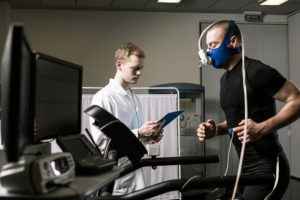
20 healthy young men aged 21 years used a cycle ergometer at about 50% of their physical capacity for 10 minutes followed by maximum intensity exercise for another 30 minutes. This sequence was repeated 3-times, and after the 4th series, each participant continued at the highest speed they could sustain for 20 minutes.
This protocol was performed twice: once with and once without Tryptophan. Researchers found peak power output during the last 20 minutes were higher on trials performed with Tryptophan than those who performed on a placebo.[xvi]
Another trial in Spain recruited 12 healthy sportsmen who ran on a treadmill until exhaustion. Once while supplementing with Tryptophan and once with a placebo.
Total exercise time, perceived exertion rate, maximum heart rate, peak oxygen consumption, pulse recovery rate, and excess post-exercise oxygen consumption were determined during the two trials.
Total exercise time was nearly 50% greater after receiving Tryptophan than after receiving a placebo. Perceived exertion rate was lower when using Tryptophan.
The researchers concluded that the longer exercise time could be due to increased pain tolerance as a result of Tryptophan supplementation.[xvii]
Tryptophan Relieves Symptoms of Seasonal Affective Disorder
Seasonal Affective Disorder (SAD) is a form of depression experienced by many during the winter months. Symptoms include difficulty waking, decreased energy, weight gain, carbohydrate craving, difficulty concentrating, decreased libido, withdrawal, anxiety, depression and irritability.
The first order of treatment is often light therapy. But many do not respond to light therapy typically because of a mutation in the melanopsin gene and the associated signaling pathway between the retina and the pineal gland.[xviii]
The pineal gland in your brain is your source of melatonin which influences sleep cycles. Melatonin is synthesized from serotonin which is synthesized from Tryptophan.[xix]
So if light therapy doesn’t work, possibly supplementing with Tryptophan to stimulate production of serotonin and melatonin could be effective.
Researchers at the University of British Columbia in Vancouver, Canada set out to find if Tryptophan could help those with Seasonal Affective Disorder (SAD) where light therapy failed.
Patients were treated for 2 weeks using light therapy. Those who did not respond to light therapy were treated with 1 g Tryptophan 3-times per day for 2 weeks while continuing light therapy.
The addition of Tryptophan resulted in a significant reduction in depression. 64% of the patients in this study showed very good clinical responses to the combined treatment with minimal side effects.[xx]
Tryptophan Recommended Dosage
Recommended dosage of Tryptophan is 500 – 1,000 mg per day for cognitive benefit.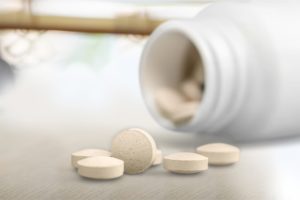
The University of Michigan Health Department recommends much higher doses for:
- Lowering appetite and cravings: .5 – 2 grams per day
- Depression or Anxiety: 2 – 6 grams per day (with medical supervision)
- Chronic pain or migraines: 2 – 4 grams per day in divided doses
- Sleep disorders or insomnia: 1 – 2 grams at bedtime[xxi]
Tryptophan is a precursor to the neurotransmitter serotonin in the brain. Tryptophan hydroxylase is the rate-limiting enzyme needed for serotonin production. And requires magnesium and Vitamin B6 to synthesize serotonin.
Tryptophan is also a precursor to the synthesis of Vitamin B3 (niacin). So if you don’t have enough niacin in your body, supplementing with L-Tryptophan will not efficiently produce serotonin because it’s being used to produce niacin. Which also depletes stores of the vitamin cofactors B1, B2 and B6.
So supplement L-Tryptophan with a B-Vitamin complex that includes Vitamins B3 and B6, and magnesium.
Note that some of the clinical trials used in this post use much higher doses of Tryptophan. Which is not recommended and usually not necessary.
Too much Tryptophan will make you sleepy. And could produce excess levels of 5-HTP and serotonin which can lead to Serotonin Syndrome.
Tryptophan Side Effects
Tryptophan is a normal part of your diet and considered non-toxic and safe at recommended doses.
But in the unlikely event that you already have adequate levels of Tryptophan in your body, supplementing with more could cause problems. As can dosing more that the recommended amount.
Tryptophan could cause stomach upset, loss of appetite, nausea, heartburn, drowsiness, headaches, dry mouth and sexual problems.
Start at the lowest dose to see how your body reacts. When first starting with L-Tryptophan take your dose in the evening to avoid possible drowsiness issues.
Caution: Low to moderate doses of Tryptophan (30 mg per pound of body weight), or about 4.5 grams for the average 165 lb. adult is considered safe and free of side effects. However, most don’t need to dose at nearly these levels.
DO NOT use L-Tryptophan if you are taking antidepressant medications including SSRI’s. Because these drugs delay normal degradation of serotonin in brain synapses leaving more serotonin circulating in your brain.
Too much Tryptophan in combination with these drugs can produce Serotonin Syndrome which can lead to delirium, involuntary muscle contractions, high fever, and coma. And worse case and a very real scenario is death.[xxii]
Type of Tryptophan to buy
L-Tryptophan is available in tablet and capsule form usually 500 – 1,000 mg.
You also get Tryptophan in foods you eat including chocolate, oats, bananas, dried dates, milk, cottage cheese, meat, fish, turkey, and peanuts.
Approximately 300 mg of Tryptophan is available in three ounces of turkey, lamb, beef, tuna, or peanuts. Fortunately, relative to other amino acids, small amounts are needed for a therapeutic effect.
And you get 200 mg L-Tryptophan in Click for Performance Lab® Sleep which also contains 100 mg magnesium (as Magnesium Bisglycinate, Magnesium Taurate, & NutriGenesis® Magnesium) and 500 mg Montmorency Tart Cherry (as CherryPURE®).
But there are all kinds of reasons why your body may not be making good use of the Tryptophan you’re getting from food. See “Tryptophan Benefits” for more on why it may be a good idea for you add Tryptophan to your stack.
Nootropics Expert Recommendation
Tryptophan 500 – 1,000 mg per day
 I recommend using Tryptophan as a nootropic supplement.
I recommend using Tryptophan as a nootropic supplement.
Your body does get some Tryptophan from the food you eat. But this amino acid is competing with other amino acids for transport to your brain. It’s competing for the same receptors. And carbohydrates vs. proteins in your meals can affect Tryptophan’s ability to synthesize serotonin in your brain.
Supplementing with L-Tryptophan will make more of this amino acid available to synthesize serotonin and melatonin.
L-Tryptophan is especially helpful for those with low serotonin levels. Boosting this crucial neurotransmitter can help alleviate insomnia, pain, depression and anxiety.
Start with 500 mg of L-Tryptophan per day and take it in the evening. See how your body reacts and how you feel the next day. Increase the dose to no more than 2 grams per day as needed. And watch for side effects.
L-Tryptophan requires adequate levels of Vitamin B3, B6 and magnesium for serotonin synthesis. So add a good B-Complex vitamin and magnesium to your stack when using L-Tryptophan.
And if you’re dealing with insomnia, consider trying Click for Performance Lab® Sleep

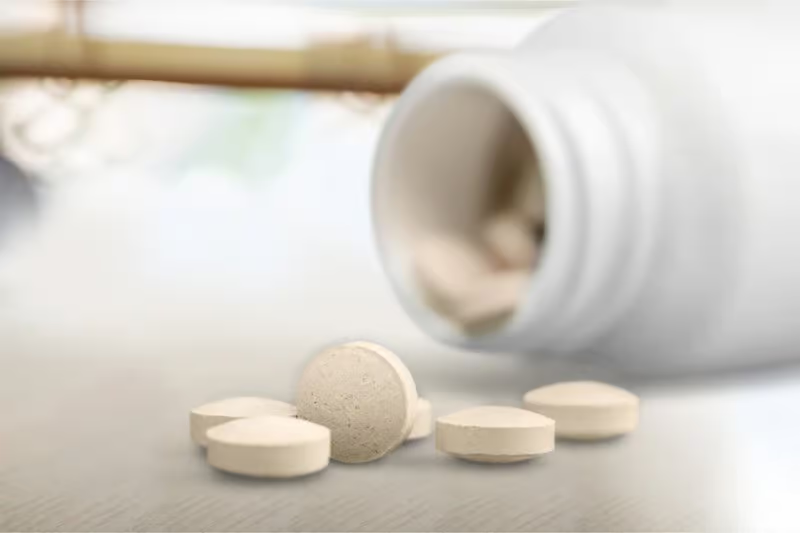
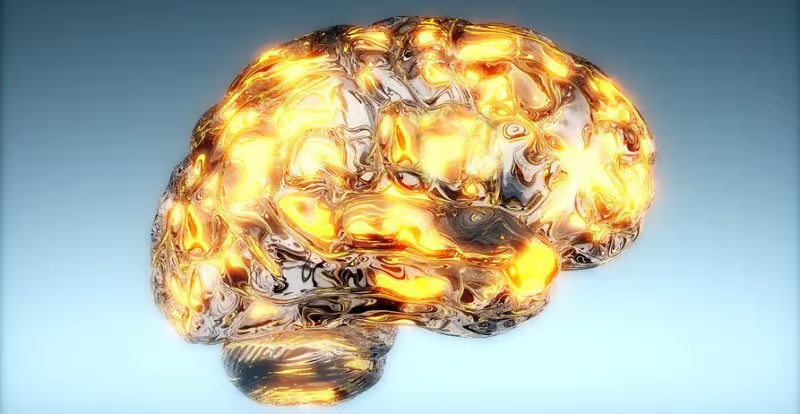






Join The Discussion - 388 comments
Mariana
October 3, 2019
Hello! Thank you for all the information you provide here in your blog and your youtube channel.
I am new to the concept of nootropics and doing my beet to learn about interactions between ingredients.
My husband work is very demanding, he is at the computer many hours per day and he is stressed almost every day. To make things worse it takes him hours to fall asleep and when he is asleep he wakes up
often.
I bought a pre-made mood/calming mix with the hope that it will help with his daytime stress. This supplement contains Vitamins Bs, a little of magnesium and a mix of natural ingredients like lemon balm extract , hops extract, passion flower extract, ashwagandha, bacopa and rhodiola rosaea.
In addition to that I got some L-tryptophan for him to take before bed and Magtein too.
Is there anything else that L-tryptophan will need to work effectively? is there any posible bad interaction between the “mood” supplement and the Ltryptophan or magtein?
Thank you so much in advance.
David Tomen
October 3, 2019
Mariana, L-Tryptophan needs a great B-Complex to work with which looks like you already have. And no contraindication I can see in your stack so far. But I don’t know what prescription meds he’s taking.
Sounds like your husband’s day is a lot like mine. Take a look at the stack I use daily for more tips: https://nootropicsexpert.com/what-i-take/
One thing I see missing is he likely needs L-Tyrosine or NALT for boosting dopamine. And the other critical thing is are the dosages of each of the supplements he’s using high enough?
Please refer to each of the individual reviews I’ve done for these nootropics and pay close attention to the “Dosage Notes”. Amounts and timing during the day are very important.
Mariana
October 3, 2019
Thank you so much for your answer.
He is not taking any medication (except for Ibuprofen when he has migraines).
He doesn’t have any known disease or illness. But the stress and bad sleep are affecting his daily interactions and wellness.
He hasn’t been taking any other supplement so we are starting fresh here.
We will start with the smallest recommended dosage and see how he feels.
We will be also getting some regular multivitamins to cover whatever nutrient he could be not getting from his diet (which is mostly caffeine).
Will it be ok to take the B vitamins in the morning and the tryptophan/Magnesium/NaLT before bed?
I also remember reading somewhere about tryptophan requiring SAM-e? I checked the link for this specific ingredient but it is not clear to me if it is necessary, or it can be skipped, and still have tryptophan work anyway.
Thank you again
David Tomen
October 5, 2019
Mariana, I do not recommend using NALT before bed because it is a precursor to dopamine. And dopamine is used during the day.
L-Tryptophan requires several B-Vitamins and some other nutrients included SAM-e to synthesize serotonin. But some of these (including SAM-e) should already be present in his system.
For now I suggest a high quality B-Complex but NOT “some regular vitamins”. Because regular vitamins are useless and often do more harm than good. Please see this post to see why: https://nootropicsexpert.com/how-to-select-the-best-multivitamin-for-brain-function/
Mariana
October 6, 2019
Thank you!
I will check that post for sure !
maria
September 14, 2019
I am reading about how tryptophan can sometimes convert into a neurotoxic substance called quinolinic acid.
Have you heard of this? Do you feel it’s something to worry about? Thanks.
David Tomen
September 15, 2019
Maria, I’ve never come across anything like this in all of my research for L-Tryptophan or 5-HTP. But the author of the article pointed out an important point. Your body and brain cannot synthesize serotonin, 5-HTP or melatonin without the associated cofactors needed from its synthesis including the B-Vitamins.
Damien
September 12, 2019
Hi David,
I was in an intenslely stressful situation for a few months this year. The immense anxiety I was suffering led me into insomnia and then depression. I’ve been in a hellish state for quite a long time.
I started supplementing with tyrosine, Alcar, sulbutiamine, alpha gpc, aniracetam, fish oil, vitamin d and zinc.
I didn’t notice that much shift.
I started adding tryptophan, magnesium and b6 (will add other b vitamins soon) at night.
Since adding these evening supplements I’ve been feeling more and more tired. Struggling to wake up in the morning and fatigue throughout the day.
I’m wondering if maybe my fight/flight is finally switching off and this is the level of exhaustion I am actually in and the tryptophan is helping me move back towards a baseline? Or maybe something else?
I’m still in a lot of emotional pain and discomfort yet the oppressive anxiety and depression has lifted slightly.
Be curious to know what effects tryptophan and serotonin has in recovery from periods of extreme emotional distress.
Thanks.
David Tomen
September 13, 2019
Damien, I need to know what dose you’re using for each of these nootropics and time of day you are taking them before I can comment on their effect on insomnia and feelings of daytime fatigue.
There has been some research done showing that Tyrosine is effective in helping during stressful situations: https://nootropicsexpert.com/tyrosine/
But if you’ve been dealing with intense anxiety and stress for awhile it’ll take some time to dig out of it no matter what you do. Getting dosages right, using the right nootropics and at the correct times everyday until you feel relief is the only way to get out of it.
Damien
September 13, 2019
Hi David,
Thanks for your reply.
Most days (not all) I have been having tyrosine and Alcar about 2-5g of each first thing in the morning.
Then I have sulbutiamine 500mg, aniracetam 750mg, alpha gpc 250mg, fish oil, vitamin d (5000iu), zinc picolinate 50mg, folinic acid 500ug and a tablespoon of black seed oil.
Mid afternoon I have 100mg of Mucuna.
Evening I have 500mg tryptophan, b6 34mg and magnesium.
I’ve been in emotional distress for many months. Anxiety attacks and panic that fell into depression. I’m kinda stuck in this state and find it difficult to get out of. Whenever I get any energy I find myself in anxiety and when it burns out I fall back into depression.
I’ve made small progress yet the amount of residual discomfort still in my system is a lot. It’s making it difficult to get out of the hole and get on with life.
Last night I didn’t have the evening stack and I woke up at 2.30am and couldn’t sleep. I am anxious again todayand not particularly tired.
Previous few days I had it and had huge difficulty waking up and was fatigued all day.
David Tomen
September 14, 2019
Damien, your Tyrosine and ALCAR dosage is far too high. You should only be using up to 500 mg of each when you take your stack. And to start I’d suggest doing that dosage once in the morning and again at noon.
Sulbutiamine should be around 300 mg morning and noon. Aniracetam 750 mg morning and noon. And it needs a tablespoon of unrefined coconut oil or virgin olive oil to work because Aniracetam is fat-soluble.
Change your “fish oil” to a quality DHA supplement and take it in the morning. Change folic acid to a B-Complex supplement that uses methyl-folate. Alpha GPC 250 mg morning and noon. And Vitamin D, zinc and black seed oil in the morning.
Add 500 mg GABA and about 6 ounces tart cherry juice to your sleep stack with a tablespoon of raw honey. Your body is desperate for the sleep supplements you’ve been taking but it needs them every night.
laura
September 10, 2019
Hi David, Can i take lithium orotate with L trypthophan?
David Tomen
September 11, 2019
Laura, yes you can.
Amer Jaber
August 14, 2019
Dear David.
First, Thanks for the huge information.
6 month ago i got hit badly by panic attack,anxiety and depression
My doctor advice Zoloft i tried 3 weeks then stopped because i felt worse, then start looking for alternative.
Recently after start watching your videos
i started my stack which is:
L-tryptophan 500 mg at night before sleep
During the day: 250 mg rhodiola rosea,250 mg L-tyrosine,100 ashwagandha.
i feel less depressed and better mood when i get up in the morning,
but anxiety keeps hits and pull my depression back
and feeling anxious most of the time, less focus.
i also ordered L-theanine and Holy Basil, didn’t try yet
just want to get rid of this anxiety
Please Advice i’m confused
Best Regards,
Amer
David Tomen
August 14, 2019
Amber, sounds like you are making progress. But you need to figure out what is causing the anxiety issues. This post will help or at least get you thinking about what could be the cause. And suggestions on trying different supplements to get to the bottom of it: https://nootropicsexpert.com/best-nootropics-for-social-anxiety/
Here are some other ideas on adaptogens for anxiety and stress: https://nootropicsexpert.com/top-7-nootropic-adaptogens-to-conquer-anxiety-and-stress/
David Tomen
August 14, 2019
And here’s a tip: Zoloft is a potent serotonin reuptake inhibitor. So if Zoloft made things worse then while reading that anxiety post you know to skip over the serotonin section because it sounds like problems with serotonin is not your problem. You can move on to the other sections.
Amer Jaber
August 15, 2019
I started Tryptophan 2 weeks ago and i can tell a big improvement with my depression, but 2 days ago with the same dose 500mg before bed i felt very irritation at sleep and still wake up fresh
is that a sign to reduce the dose or cut off it ? because i no longer need it ?
again thank you so much doctor
Tryptophan was a game changer for me and i discover it though you, God Bless
Best Regards,
Amer
David Tomen
August 15, 2019
Amber, I’d cut the dose in half and see if you have the same reaction. If it’s a capsule, open it and dump half out. It is possible to increase serotonin too much.
Amer Jaber
August 21, 2019
Dear David
i’m now on 500mg Trypto and all ok feeling better by the day
i also started with L theanine at 300-450mg during the day,
as far now, i’m feeling things getting better
i’m also taking Holy basil it’s amazing i love it
is there any issue to stake L-tryptophan with L-theanine ?
if yes what about long term use ? shall we take a break at some point ?
Thank you so much
Best Regards
Amer
David Tomen
August 21, 2019
Amer, no issues stacking L-Tryptophan with L-Theanine. Happy to hear you’re having some success.
Jay LIM
June 21, 2019
Dear David
Recently, I tried NALT for depression. (700mg/day for 9 days and five days off. and 1050mg/day for 8days, Of course with vitamin B6,9,12) But it doesn’t seem to be working for me. so now I try L-tryptophan.
How long time does it usually take for L-tryptophan to respond to depression? It’s been a week since I took 1,000 milligrams of tryptophan every morning. (with B-complex, magnesium and others) But it isn’t working yet.
A few years ago, I used to take SSRI and it worked for me, but I had to increase the dosage every three months. and I took St. John ‘s wort and it worked for me, but I had to increase the dosage every few months too. so now I’m trying hard to find another way without ‘tolerant’. Thank you very much for your help in my efforts to find the way.
David Tomen
June 21, 2019
Jay, if you’ve tried increasing dopamine and then serotonin and neither worked for depression there must be another cause. Studies have recently found that some SSRIs work not by boosting serotonin but by taming inflammation in the brain. Please take a look through this post for the sections on taming inflammation and try some of the nootropics mentioned. And see if that helps: https://nootropicsexpert.com/neurohackers-guide-to-lab-tests/
Adam Saadi
March 26, 2019
Hi David
Is supplementing with Tryptophan safe on the long-term (6 months – 1 year)? What is the recommended dosage and the best time to take it for depression?
Kind regards
Adam
Sivakumar pillai
February 27, 2019
Hello David,
I am a depressive patient. I am 60 yrs old. I was an alcoholic for 20 yrs. By the grace of God sober for 20 yrs. But using chewing Tabasco for 30 yrs. At my drinking time also I was depressed.Buti thought it is due to drinking. After sobering up i visited a physcatrist. For two years the drug worked and i was hyperactive.Afterthat the effect faded. The dr increased the dosage but of no use. I recievd 13 ECT.That also never worked. But i was functioning. But for the past six years i dont goout of my flat frequently. Always lying in the bed but not sleeping. I care less about shaving or bathing. I rarely go out.
Now before 1 year I had a road accident. I was more depressed. After 2 months I had an heartattac. After 2 months again I had another attack.
I am not taking any medicines for cardiac or depression.
But following a plant based diet of dr.Esselstyn.
I am having this depression and constipation.
If I get cure for this I will be happy.
I am taking niacinamide whom thrice. I take b complex and multivitamin magnesium and zinc suppliment.
I follow your articles and appreciate your passion and in-depth knowledge. I am from India where this alternative medical Dodgers are not available. I WILL BE VERY GRATFUL if you could guide me oin taking amino acid supplements for my depression
Thanking you
Siva Kumar pillai
David Tomen
February 27, 2019
Siva, it depends on what the cause is for your depression. If you were a heavy drinker it could indicate a problem with dopamine. But the only real way to find out is to experiment with various nootropics that affect each of the neurotransmitters and pathways in your brain.
Please see this post for a better understanding on what I’m talking about: https://nootropicsexpert.com/best-nootropics-for-depression/
You could try something like L-Tyrosine for dopamine for a few days and see if that helps. If not, then try L-Tryptophan for serotonin for a few days. Work your way through the different possibilities based on the post I linked to until you start experiencing some positive results.